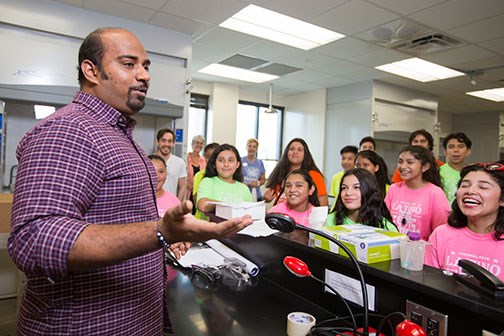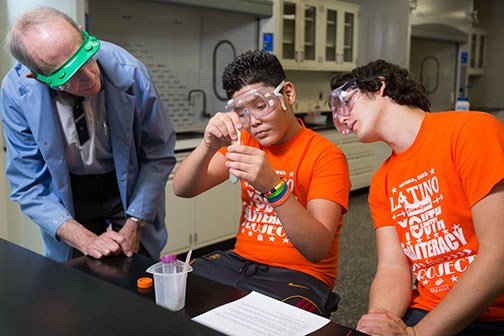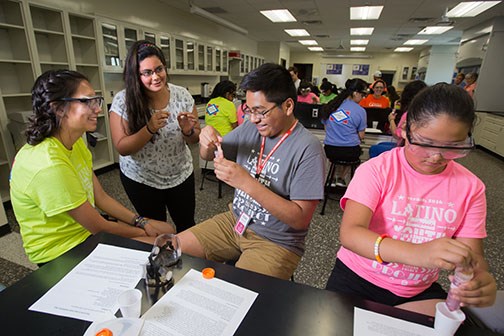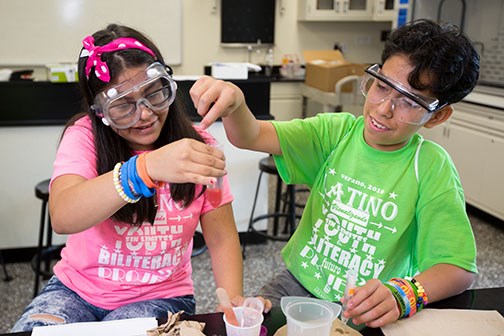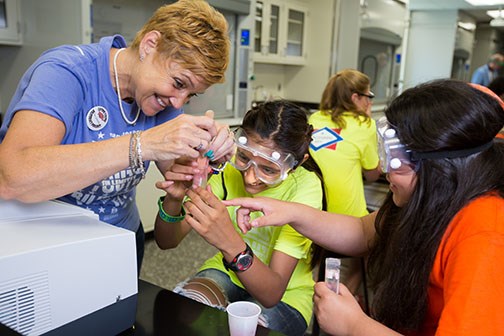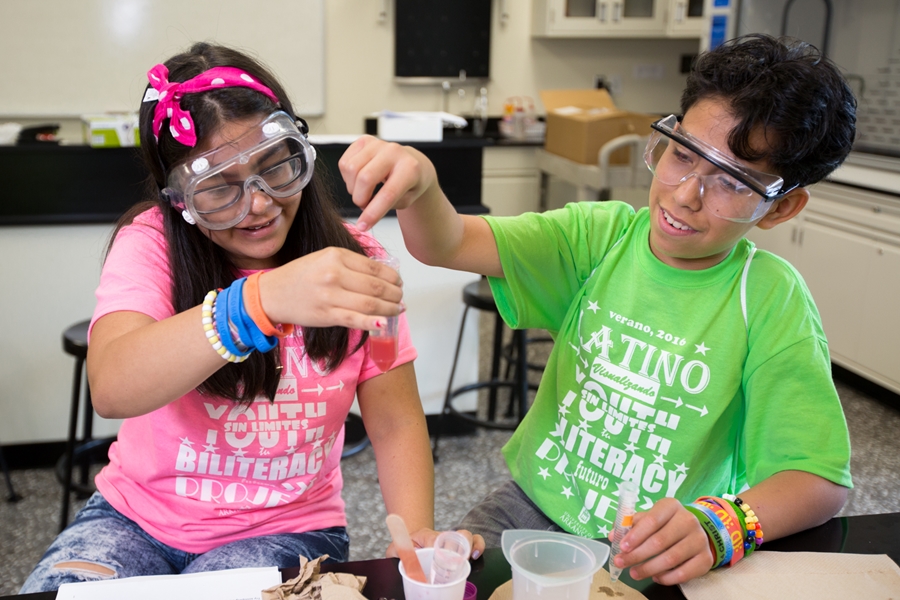
FAYETTEVILLE,Ark. -- Jose Flores perched on a stool in a Discovery Hall chemistry lab, pulled on a pair of oversized goggles and grinned at his lab partner. "I'm a scientist!" the 12-year-old exclaimed.
The duo mashed chopped strawberries with dish detergent, hot water and salt, then filtered the paste through mini coffee filters, and trickled ice cold ethanol into the test tube. Ten minutes later, a whitish-colored layer floated between the pink liquid and the clear ethanol. Jose dipped a wire loop into that layer and pulled out a sticky bead of strawberry DNA.
Jose was one of 15 middle school students visiting the University of Arkansas campus last month with the Latino Youth Biliteracy Project, an outreach program of the university's La Oficina Latina: The Office of Latino Academic Advancement and Community Relations, and the Department of World Languages, Literature and Cultures within the J. William Fulbright College of Arts and Sciences.
Also known as Sin Limites - "without limits" - the program seeks to enhance students' literacy in both Spanish and English and encourage them to dream big for their futures. University students mentor the Latino youth during a two-week summer camp at J.O. Kelly Middle School in Springdale and at after-school or lunchtime programs at J.O. Kelley and Lowell Elementary School in Rogers during the academic year.
The purpose of the hands-on visit to the university was to introduce campers to the idea of higher education and help break down barriers that may keep lower income Latino kids from attending college.
"It opens up their eyes to the many possibilities," said Oscar Cardona, a mentor who began volunteering with the program as a U of A undergrad majoring in Spanish and Latin American Studies. He continued mentoring while he obtained his Master of Arts in Teaching, and now teaches Spanish at Rogers High School. "Because they haven't seen what other people can accomplish in life, they are closed minded. [This program] shows them not to be afraid. You can do whatever you want, as long as you set your mind to it."
The campus tour started with an introduction to Upward Bound, the college prep program for underprivileged high school students. The day continued with the chemistry lab, lunch at Brough Commons, and visits to the engineering and agriculture departments. Along the way, the group stopped for photos at the Fulbright Peace Fountain and the Chi Omega Greek Theater.
Program co-director Jeanette Arnhart shepherded students across campus, aided by a team of volunteers. Many were U of A students in the upper-level Spanish language service learning course Arnhart has taught in previous years. Others were students from Northwest Arkansas Community College and area high schools.
Children who grow up in Spanish-speaking homes often learn to speak the language on an informal level not suited for the professional world, said Arnhart, a doctoral student in the U of A's Interdisciplinary Hispanic track of the Comparative Literature and Cultural Studies Program and a former instructor of world languages in the Fulbright College.
She said that Sin Limites helps children develop Spanish language reading and writing skills through a combination of literacy classes, creative arts workshops and friendly competition. Students might be challenged to list all the words they know pertaining to a circus, for example.
"They're playing games, and they don't know that they're learning a lot of new vocabulary at the same time," Arnhart said. "It's all hands-on, fun, literacy skill building."
Biliteracy refers to the ability to read and write a second language, as well as being fluent in spoken communication, said program co-director Luis Fernando Restrepo, professor of world languages in the Fulbright College and former director of La Oficina Latina.
Exercising the brain in two languages has benefits that range from the cognitive to the cultural, Restrepo said. Research from the Center for Applied Linguistics in Washington, D.C., shows that being biliterate improves students' academic performance, because they are able to transfer analytical and reading skills across languages, he said. Restrepo and colleagues in the Fulbright College Department of English and the Sam M. Walton College of Business have recently started the NWA Biliteracy Project to foster greater community support for language diversity.
Sin Limites, which started in 2013, is sponsored in part by a 21st Century Community Learning Centers federal grant awarded to J.O. Kelly Middle School under the leadership of Principal Sara Ford. The Women's Giving Circle at the U of A, the Department of World Languages, Literatures and Cultures, La Oficina Latina and Centennial Bank also provide funding for the program, which is offered free of charge.
Sin Limites stresses the benefits of being bilingual, something students do not often hear, Arnhart said.
"We want to make connections between school, home, community and culture," she explained. "We want to give the kids confidence to understand that the language they speak at home is just as valuable as the language they speak in school. They don't have to give up one to acquire another."
Arnhart pointed her camera at campers as they streamed down the red brick walkway from Fulbright Fountain to the Bell Engineering Center. "What a great photo," she exclaimed. "They're walking toward the future."
Topics
Contacts
Bettina Lehovec, staff writer
University Relations
479-575-7422,
Andra Parrish Liwag, director of communications
J. William Fulbright College of Arts and Sciences
479-575-4393,
